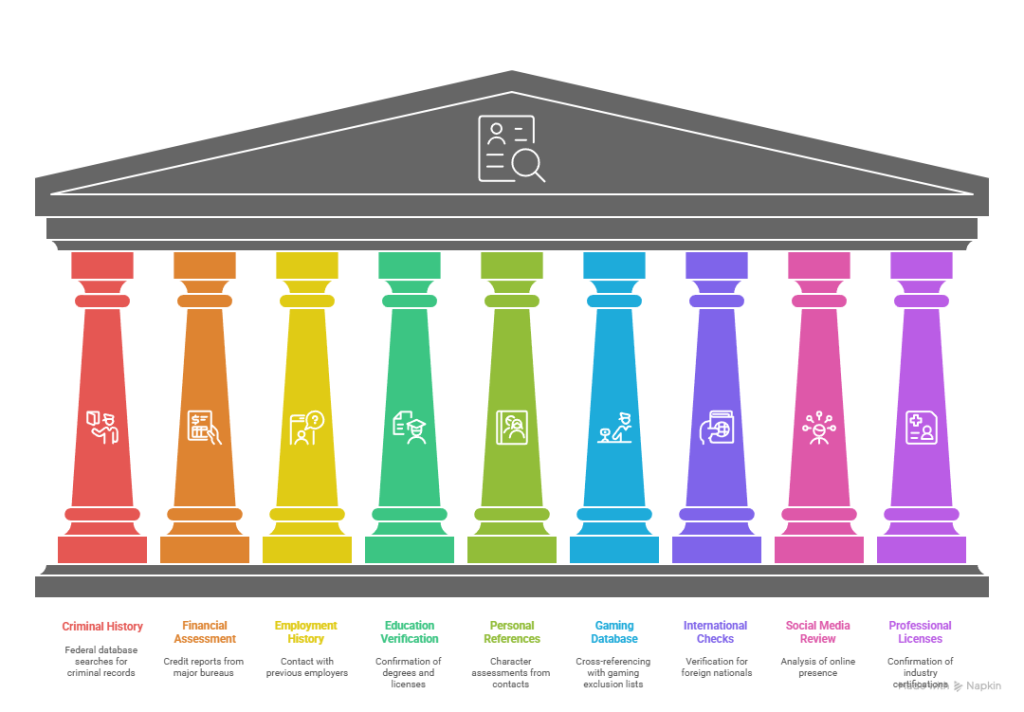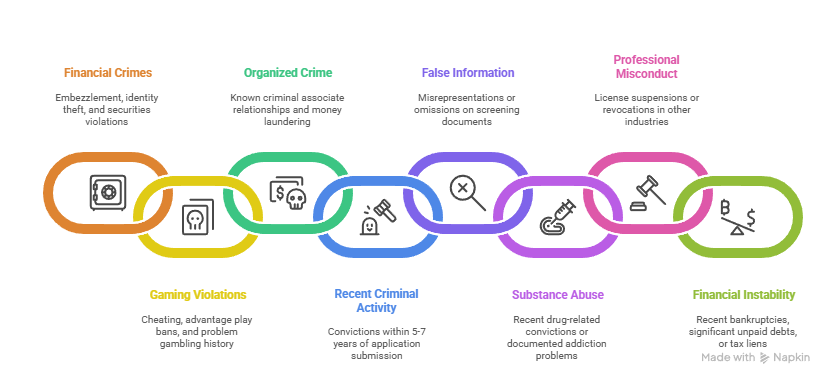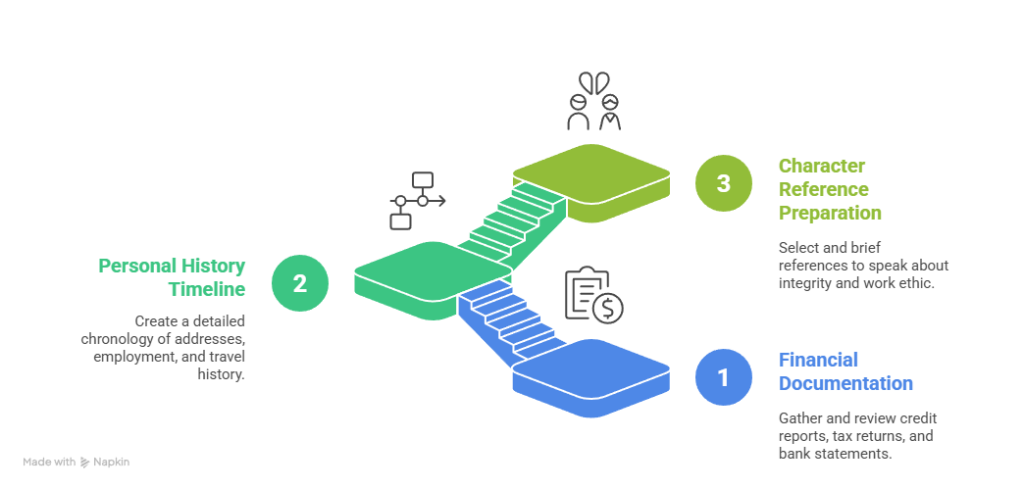The rapidly expanding sports betting industry requires comprehensive background screening due to strict regulatory compliance, with all gaming positions subject to extensive vetting processes that examine criminal history, financial records, and personal integrity. Job seekers entering this lucrative field must understand that sports betting background checks are significantly more thorough than traditional employment screening, often taking 4-8 weeks to complete.
Key Takeaways
- Sports betting background checks involve multi-level screening including state gaming commission approval, federal database searches, and financial history review
- Gaming license requirements vary by state but typically include fingerprinting, credit checks, and extensive personal history documentation
- Job seekers with minor criminal records may still qualify for certain positions, as each case is evaluated individually based on relevance and timeframe
- Daily fantasy sports background checks follow similar protocols to traditional sportsbooks, requiring comprehensive personal and financial vetting
- Sportsbook employee screening costs range from $150-$500 per candidate, with employers covering these expenses in most cases
- The background check process typically takes 30-60 days, during which conditional employment offers may be extended pending approval
Understanding Sports Betting Industry Background Requirements
The sports betting industry operates under stringent regulatory frameworks that mandate comprehensive background screening for all personnel. Gaming commissions across various states have established rigorous standards to ensure industry integrity and prevent criminal infiltration. These requirements extend beyond traditional employment screening to encompass financial stability, personal associations, and moral character assessments.
State gaming authorities require detailed personal histories dating back 10-15 years for key positions. The screening process examines criminal records, civil litigation, bankruptcy filings, and professional licenses. Additionally, candidates must demonstrate financial responsibility and disclose any gambling-related issues or associations with known criminals. These comprehensive investigations protect both consumers and the gaming industry from potential fraud or corruption.
The regulatory landscape continues evolving as more states legalize sports betting. Currently, over 38 states have operational sports betting markets in 2025, each with unique licensing requirements and background check protocols. This expansion creates numerous employment opportunities while maintaining strict compliance standards. Furthermore, the industry generated over $10 billion in revenue in 2024, highlighting the significant financial stakes involved in maintaining regulatory compliance. The rapid growth has also intensified competition among operators, making qualified and properly licensed personnel increasingly valuable in the marketplace.
Legal Framework and Regulatory Authority
Gaming commissions derive their authority from state legislation that establishes comprehensive regulatory frameworks for sports betting operations. These laws typically grant broad investigative powers to gaming authorities, including the ability to conduct thorough background investigations on all personnel involved in gaming activities. The legal foundation ensures that gaming commissions can access criminal databases, financial records, and other sensitive information necessary for comprehensive screening.
Federal regulations also impact sports betting background checks through various agencies and laws. The Bank Secrecy Act requires gaming operators to implement anti-money laundering programs and report suspicious activities. The Racketeer Influenced and Corrupt Organizations Act (RICO) provides additional tools for preventing organized crime infiltration of gaming operations. These federal requirements complement state-level screening processes and create multiple layers of oversight.
Interstate commerce considerations become important when gaming companies operate across multiple jurisdictions. The Professional and Amateur Sports Protection Act (PASPA) repeal in 2018 opened the door for state-by-state legalization, but created complex compliance challenges for multi-state operators. Companies must navigate varying requirements while ensuring consistent standards across all locations. This complexity has led to increased demand for compliance professionals who understand both federal and state requirements.
Types of Gaming Positions Subject to Background Screening
Gaming commission oversight applies primarily to key positions that directly impact sports betting operations. These roles include executives, managers, odds compilers, traders, and customer service representatives handling monetary transactions. Security personnel, compliance officers, and IT staff with system access also require comprehensive screening. Moreover, the increasing integration of artificial intelligence and machine learning in sports betting platforms has expanded screening requirements to include data scientists and algorithm developers.
Executive and Management Roles
Executive positions undergo the most extensive background screening processes due to their significant influence on company operations. Chief Executive Officers, Chief Financial Officers, and department heads must provide comprehensive financial disclosures spanning multiple years. These individuals often require enhanced gaming licenses that involve interviews with gaming commission investigators and detailed character assessments from professional associates.
The screening process for executives can take 8-12 weeks to complete. Gaming commissions conduct in-depth investigations into business relationships, investment portfolios, and historical gaming industry involvement. Additionally, family members and business associates may undergo preliminary screening to identify potential conflicts of interest or regulatory concerns.
Customer-Facing and Support Staff
Customer service representatives, account managers, and payment processing staff require moderate-level background screening. These positions involve direct access to customer funds and sensitive personal information. However, the screening process typically focuses on criminal history and financial stability rather than extensive character investigations.
Daily fantasy sports background check requirements for support staff mirror traditional sportsbook protocols. Contest operators, prize fulfillment personnel, and customer dispute resolution teams undergo similar verification processes. The emergence of hybrid platforms offering both daily fantasy and traditional sports betting creates additional complexity in determining applicable screening requirements.
Technology and Security Personnel
Information technology professionals working with gaming systems face comprehensive background screening due to their access to critical infrastructure. Network administrators, cybersecurity specialists, and software developers must demonstrate technical competence alongside personal integrity. Gaming commissions recognize that technology vulnerabilities can compromise entire betting operations.
Security personnel, both physical and digital, undergo enhanced screening processes that include psychological evaluations and polygraph examinations in some jurisdictions. These professionals protect valuable gaming assets and customer information from both external threats and internal misconduct. Consequently, their background investigations often rival those conducted for law enforcement positions.
Marketing and Business Development Teams
Marketing professionals and business development specialists increasingly require background screening as gaming operators expand their promotional activities. These roles often involve partnerships with professional sports organizations, media companies, and other high-profile entities. Gaming commissions want to ensure that personnel representing gaming companies maintain appropriate professional standards and ethical conduct.
Affiliate marketing managers and partnership coordinators handle relationships with third-party marketing companies that promote gaming services. These positions require understanding of both gaming regulations and advertising standards. Background screening for these roles focuses on professional integrity and compliance with marketing regulations rather than the extensive financial investigations required for executive positions.
Comprehensive Background Check Components
The comprehensive nature of sportsbook employee screening encompasses multiple verification areas designed to assess candidate suitability for gaming industry employment. Gaming commissions mandate specific checks to maintain regulatory compliance and protect consumer interests. Understanding these components helps job seekers prepare appropriate documentation and set realistic timeline expectations.

- Criminal History Verification: Federal criminal database searches covering all jurisdictions
- Financial Background Assessment: Credit reports from all three major bureaus
- Employment History Confirmation: Direct contact with previous supervisors and HR departments
- Education and Certification Verification: Confirmation of degrees and professional licenses
- Personal Reference Interviews: Character assessments from professional and personal contacts
- Gaming Database Searches: Cross-referencing with tribal and commercial gaming exclusion lists
- International Background Checks: Criminal and financial verification for foreign nationals
- Social Media and Public Records Review: Analysis of online presence and public statements
- Professional License Verification: Confirmation of industry certifications and specialized credentials
Gaming authorities maintain shared databases to track individual gaming histories and identify potential risks. This interconnected system ensures comprehensive oversight across state lines and gaming jurisdictions. Additionally, emerging biometric technologies are being integrated into background screening processes to enhance identity verification and prevent fraud. These technological advances help gaming commissions process applications more efficiently while maintaining thoroughness and accuracy.
State Gaming Commission Requirements and Processes
Different states maintain varying standards for sports betting background checks, creating complexity for multi-state operators and traveling employees. Nevada's established gaming industry provides the most comprehensive framework, requiring detailed personal history disclosure and associate background information. New Jersey follows similar protocols while emphasizing organized crime prevention measures developed during casino industry expansion.
| State | Processing Time | License Fee | Key Requirements |
| Nevada | 60-90 days | $200-$500 | 15-year history, associate disclosure |
| New Jersey | 45-75 days | $150-$400 | Comprehensive personal history, organized crime screening |
| Pennsylvania | 30-60 days | $100-$300 | Criminal history, credit check, employment verification |
| Arizona | 45-60 days | $125-$350 | Financial disclosure, character references |
| Colorado | 30-45 days | $100-$250 | Standard background with gaming-specific additions |
| Illinois | 45-75 days | $175-$425 | Enhanced financial review, professional references |
| Michigan | 30-60 days | $150-$375 | Comprehensive criminal history, employment verification |
Pennsylvania and other newer gaming states have adopted streamlined processes to encourage industry growth while maintaining regulatory standards. However, core requirements remain consistent across jurisdictions, including criminal history verification, financial stability assessment, and personal integrity evaluation. Interstate reciprocity agreements are developing to reduce duplicative screening for employees working across multiple gaming jurisdictions.
Federal Oversight and Multi-State Coordination
Federal agencies coordinate with state gaming commissions to ensure comprehensive background screening across jurisdictional boundaries. The Treasury Department's Financial Crimes Enforcement Network (FinCEN) provides critical anti-money laundering intelligence to gaming regulators. Similarly, the Federal Bureau of Investigation maintains databases that state commissions access during their investigations.
Multi-state gaming operators benefit from emerging reciprocity agreements that streamline employee transfers between licensed jurisdictions. These agreements reduce duplicative screening while maintaining regulatory standards. However, employees must still comply with state-specific training requirements and ongoing compliance obligations in each jurisdiction where they work.
Background Check Timeline and Process Steps
The sports betting background check process typically spans 4-8 weeks from initial application submission to final approval. Gaming commissions prioritize thoroughness over speed, conducting comprehensive reviews that may extend beyond standard employment screening timelines. Job seekers should factor these extended periods into their employment planning and financial considerations.
Initial application submission requires extensive documentation including personal history forms, financial statements, and character references. Fingerprinting appointments must be scheduled through approved vendors, often creating additional delays during peak hiring periods. Gaming commissions then conduct independent verification of all submitted information through various databases and investigative resources.
| Timeline | Phase | Key Activities |
| Week 1-2 | Application and Documentation Review | Complete personal history questionnaire submission, financial disclosure forms and supporting documentation, character reference contact information and authorization forms |
| Week 3-4 | Criminal and Financial Verification | Federal and state criminal database searches across all jurisdictions, credit report analysis from Experian, Equifax, and TransUnion, bankruptcy and civil litigation record searches |
| Week 5-6 | Reference Contacts and Employment Verification | Direct interviews with professional and personal references, employment history confirmation with previous supervisors, education and professional license verification |
| Week 7-8 | Gaming Commission Review and Final Determination | Comprehensive file review by gaming commission investigators, additional information requests or clarifications as needed, final suitability determination and license issuance |
Some positions may qualify for temporary licensing pending full background completion. These provisional arrangements allow candidates to begin work under supervision while maintaining compliance requirements. However, negative findings during the extended review process can result in immediate employment termination and license revocation.
Common Disqualifying Factors and Mitigation Strategies
Gaming commissions evaluate background check results based on established suitability standards that prioritize public safety and industry integrity. While criminal records don't automatically disqualify candidates, certain offenses create significant barriers to gaming industry employment. Understanding these factors helps job seekers make informed career decisions and prepare appropriate explanations for potential concerns.
Serious disqualifying factors include felony convictions involving fraud, theft, or financial crimes, as gaming authorities view these as directly relevant to industry operations and consumer protection. Gaming-related violations or casino bans indicate potential ongoing risks and typically result in automatic disqualification. Additionally, organized crime associations or money laundering involvement trigger immediate rejection due to federal anti-racketeering concerns.

- Financial Crimes and Fraud: Embezzlement, identity theft, and securities violations
- Gaming-Related Violations: Cheating, advantage play bans, and problem gambling history
- Organized Crime Connections: Known criminal associate relationships and money laundering
- Recent Criminal Activity: Convictions within 5-7 years of application submission
- False Application Information: Misrepresentations or omissions on screening documents
- Substance Abuse Issues: Recent drug-related convictions or documented addiction problems
- Professional Misconduct: License suspensions or revocations in other industries
- Financial Instability: Recent bankruptcies, significant unpaid debts, or tax liens
However, potentially mitigating circumstances can overcome some negative factors through demonstrated rehabilitation and character development. Time elapsed since conviction or violation occurrence carries significant weight, with most jurisdictions applying decreasing importance to older offenses. Offense relevance to gaming industry operations also influences suitability determinations, as non-financial crimes may receive limited consideration if unrelated to job responsibilities.
Appeals Process and Legal Representation
The appeals process allows candidates to contest negative determinations through formal hearings and additional documentation submission. Success rates vary significantly based on offense type and individual circumstances surrounding the disqualifying events. Gaming attorneys specializing in licensing matters can provide valuable guidance throughout the appeals process.
Successful appeals typically demonstrate genuine rehabilitation through employment stability, education completion, and community involvement. Character witness testimony from respected community members can strengthen appeals significantly. Additionally, expert psychological evaluations may address underlying issues that contributed to past problems and demonstrate current stability.
Preparing for Your Sports Betting Background Check
Successful preparation for sports betting background checks requires comprehensive documentation gathering and proactive disclosure of potential issues. Gaming commissions appreciate transparency and view attempted concealment as evidence of poor character or judgment. Job seekers should compile thorough records spanning the required lookback period, typically 10-15 years for most positions.
Essential documentation includes complete employment history with supervisor contact information, educational transcripts and certifications, and financial records demonstrating stability. Criminal history records from all jurisdictions of residence help candidates understand what investigators will discover. Professional references should be contacted in advance to expect gaming commission inquiries and prepare them for detailed character questions.

- Financial Documentation Requirements: Current credit reports from all three bureaus should be obtained and reviewed for accuracy before application submission. Tax returns, bank statements, and investment account records covering recent years demonstrate financial stability and responsibility. Additionally, any bankruptcy filings, judgments, or liens should be fully documented with supporting court records and satisfaction documentation.
- Personal History Timeline Creation: Detailed chronologies of addresses, employment, and travel history prevent inconsistencies that could delay processing. International travel may require additional documentation and extended processing times due to foreign background check requirements. Military service records, including discharge documentation and security clearance history, should be readily available for veteran applicants.
- Character Reference Preparation: Professional and personal references should be selected based on their ability to speak knowledgeably about integrity and work ethic over extended periods. References should be briefed about the gaming industry's high standards and potential investigation scope. Additionally, references should be prepared to discuss specific examples of honesty, reliability, and ethical behavior in challenging situations.
Candidates with potential disqualifying factors should consult with gaming attorneys or compliance specialists before application submission. Professional guidance helps frame negative information positively and identify strategies for successful appeals if necessary. Moreover, early consultation can prevent procedural errors that might complicate the approval process.
Documentation Organization and Submission
Proper documentation organization significantly impacts processing efficiency and demonstrates professionalism to gaming commission reviewers. Applications should be complete, accurate, and well-organized to facilitate thorough review. Missing or incomplete information creates delays and may raise questions about candidate attention to detail.
Electronic submission systems are becoming standard across most gaming jurisdictions in 2025. However, supporting documentation often requires original signatures and notarization. Applicants should maintain both digital and physical copies of all submitted materials for their records and potential follow-up requests.
Employer Responsibilities and Legal Compliance
Sportsbook employee screening costs typically range from $150-$500 per candidate, depending on the depth of investigation required and specific state requirements. Most employers absorb these expenses as part of their hiring process, though some may require reimbursement if employees leave within specified periods. Gaming license fees, fingerprinting costs, and ongoing renewal expenses create additional financial considerations for both employers and employees.
Employers must maintain compliance with various employment laws while conducting gaming background checks. The Fair Credit Reporting Act (FCRA) requires specific disclosure and consent procedures for credit and background investigations. Additionally, state employment laws may impose restrictions on the use of criminal history information in hiring decisions, creating potential conflicts with gaming commission suitability standards.
| Cost Component | Employer Responsibility | Employee Responsibility | Typical Amount |
| Background Investigation | Primary responsibility | Cooperation and disclosure | $200-$400 |
| Gaming License Application | Often reimbursed | Initial payment | $100-$300 |
| Fingerprinting Services | Usually covered | Appointment scheduling | $25-$75 |
| Renewal Fees | Varies by company policy | May be employee obligation | $50-$200 annually |
| Training and Certification | Company-provided | Completion required | $100-$500 |
Equal Employment Opportunity Commission (EEOC) guidelines require individualized assessments of criminal history information rather than blanket exclusions. However, gaming industry regulations may supersede general employment law protections in certain circumstances. Employers must navigate these competing requirements carefully to avoid discrimination claims while maintaining regulatory compliance.
FCRA Compliance and Privacy Protections
Fair Credit Reporting Act compliance requires specific procedures when conducting background checks for employment purposes. Employers must provide clear disclosure that background checks will be conducted and obtain written consent before proceeding. Additionally, adverse action procedures must be followed if negative information influences hiring decisions.
Gaming industry background checks often exceed standard FCRA requirements due to regulatory mandates. However, basic privacy protections and disclosure requirements still apply throughout the process. Employers should work with qualified background screening companies familiar with gaming industry requirements and FCRA compliance obligations.
Conclusion
Sports betting background checks represent a critical gateway into the rapidly expanding gaming industry, requiring comprehensive preparation and realistic timeline expectations. Job seekers who understand the process requirements and prepare thorough documentation significantly improve their approval chances while reducing processing delays. The investment in proper preparation pays dividends through access to lucrative career opportunities in this growing sector. As the industry continues evolving in 2025, staying informed about changing regulations and technological innovations remains essential for both candidates and employers navigating this complex landscape.
Frequently Asked Questions
How long does a sports betting background check take?
Sports betting background checks typically take 4-8 weeks to complete, depending on the complexity of your personal history and the specific state requirements. Gaming commissions prioritize thoroughness over speed, conducting comprehensive reviews that may extend beyond standard employment screening timelines.
Can I work in sports betting with a criminal record?
Having a criminal record doesn't automatically disqualify you from sports betting employment, but it depends on the nature and timing of the offense. Gaming commissions evaluate each case individually, considering factors like the type of crime, how long ago it occurred, and its relevance to gaming industry operations.
What's included in a sportsbook employee screening?
Sportsbook employee screening includes criminal history verification, financial background checks, employment history confirmation, education verification, and personal reference checks. The process also involves fingerprinting, gaming commission database searches, and assessment of personal associations.
Do I need a gaming license to work at a sportsbook?
Gaming license requirements vary by state and position type. Key employees, managers, and those handling money typically need gaming licenses, while some support positions may only require background clearance. Check your specific state's gaming commission requirements for your intended role.
How much does a sports betting background check cost?
Sports betting background checks typically cost $150-$500, including gaming license fees, fingerprinting, and investigation expenses. Most employers cover these costs as part of their hiring process, though some may require reimbursement if you leave employment within a specified period.
Can I appeal a negative background check decision?
Yes, most gaming commissions offer appeals processes for negative background check decisions. You can request hearings, submit additional documentation, and present mitigating circumstances. Success rates vary based on the specific disqualifying factors and individual circumstances.
Additional Resources
- American Gaming Association Employment Guidelines
https://www.americangaming.org/research/employment-guidelines - National Indian Gaming Commission Background Investigation Standards
https://www.nigc.gov/compliance/background-investigations - International Association of Gaming Regulators Best Practices
https://www.iagr.org/best-practices-employment-screening - Society of Human Resource Management Gaming Industry Guide
https://www.shrm.org/industries/gaming-hospitality - Gaming Compliance Magazine Employment Screening Resources
https://www.gamingcompliance.com/employment-resources - State Gaming Commission Directory and Contact Information
https://www.casinoemployment.com/gaming-commissions
Still have questions?
Get in touch with our team today for a personalized demo and discover how our tailored volume pricing and packages can drive results for your business!
How useful was this page?*
Note: your comments are anonymous. We use them to improve the website. Do not include any personal details.
Visit our FCRA Compliance Tool or leave a message here if you need a response.
From the blog Explore the GCheck Content Hub

How Long Do Background Checks Take for Government Jobs? Timeline Expectations for 2026
6 Jan, 2026 • 20 min read
Driver Qualification File Requirements: Your Complete DOT Compliance Guide
6 Jan, 2026 • 18 min read
Healthcare Background Screening Costs: 2026 Budget Planning Guide for Medical Facilities
30 Dec, 2025 • 23 min readThe information provided in this article is for general informational and educational purposes only and should not be construed as legal advice or a substitute for consultation with qualified legal counsel. While we strive to ensure accuracy, employment screening laws and regulations—including but not limited to the Fair Credit Reporting Act (FCRA), Equal Employment Opportunity Commission (EEOC) guidelines, state and local ban-the-box laws, industry-specific requirements, and other applicable federal, state, and local statutes—are subject to frequent changes, varying interpretations, and jurisdiction-specific applications that may affect their implementation in your organization. Employers and screening decision-makers are solely responsible for ensuring their background check policies, procedures, and practices comply with all applicable laws and regulations relevant to their specific industry, location, and circumstances. We strongly recommend consulting with qualified employment law attorneys and compliance professionals before making hiring, tenant screening, or other decisions based on background check information.

